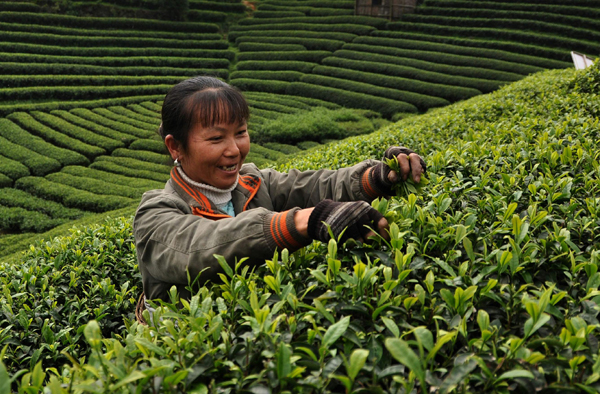Tea time loses its popularity
Updated: 2013-04-04 07:43
By Wu Yiyao (China Daily)
|
|||||||||||
Farmers feel the pinch of official squeeze on spending. Wu Yiyao reports in Shanghai.
The early bird catches the worm, and that used to be the case for the producers of Longjing tea, as the early tea harvested before Qingming (Pure Brightness) Festival used to reap them high rewards. However, this year the bottom has fallen out of the market and prices have plummeted.
"This year the price of the premium Longjing tea picked before Pure Brightness Day is 50 percent less than it was last year. Last year it was 8,000 yuan ($1,300) per kilogram, this year it's 4,000 yuan," said Mei Chongliang, a tea producer in Meijiawu, one of the four famous tea-growing areas around Hangzhou, Zhejiang province.
The Longjing tea produced before Qingming Festival, which is known as mingqian tea, is regarded as the finest of teas, and Mei and his family have profited from the high prices the prized tea has fetched in previous years.
Mei is a certified tea roaster, and his family is involved in the entire tea production process, from cultivation of the plants to the roasting of the leaves. They have a three-story house, which is divided into living accommodation, a tea production room and a teahouse.
But not only will they get less for their tea this year, Mei said the costs have risen in every stage of the production process.
"The cost of cultivating and maintaining the trees is rising - about 10 percent in the last production cycle. We are paying the tea pickers 100 yuan a day this year, up from 80 yuan last year, and other costs such as the power for the roasting are also up," he said.
Like many of his neighbors, Mei blames the sharp drop in price on the shrinking orders from wholesale dealers.
The usual throng of tea dealers and visitors, which has crowded the narrow street through the village in previous years, has not been in evidence this year.
"Last year there were so many people between 7 am and 8 pm that my staff couldn't handle them and I had to hire six extra workers," said Weng Qianmei, a teahouse owner in the village.
Related Stories
Frugality drive takes its toll on fish, tea 2013-03-30 07:01
Making of Wujiatai tea from C China 2013-03-26 16:25
Panda tea 2013-03-11 09:35
Today's Top News
Police continue manhunt for 2nd bombing suspect
H7N9 flu transmission studied
8% growth predicted for Q2
Nuke reactor gets foreign contract
First couple on Time's list of most influential
'Green' awareness levels drop in Beijing
Palace Museum spruces up
Trading channels 'need to broaden'
Hot Topics
Lunar probe , China growth forecasts, Emission rules get tougher, China seen through 'colored lens', International board,
Editor's Picks

|

|

|

|

|

|






